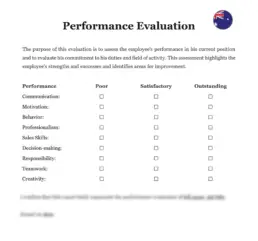The Importance of an Employee Review
An Employee Review is crucial for maintaining productivity and engagement within the workplace. This document provides a structured approach to assessing an employee’s strengths, weaknesses, and overall contributions. By consistently using an Employee Performance Evaluation, businesses can ensure that their workforce remains aligned with company goals, and any issues are addressed promptly. This practice is similar to the importance of using an Employment Offer Letter to set clear expectations from the start.
Establish Clear Evaluation Criteria
The foundation of an effective performance review is clear, objective criteria. The Employee Review should include:
1. Key Performance Indicators (KPIs): Define specific, measurable KPIs that align with the employee’s role and responsibilities.
2. Competency Assessment: Evaluate both technical skills and soft skills, such as communication and teamwork.
3. Goal Achievement: Assess the employee’s success in meeting predefined goals or targets.
Having clear criteria ensures that the evaluation is fair and unbiased, much like clearly defined terms in a Sales Contract protect both parties
Prepare for the Evaluation Meeting
Preparation is key to a productive performance review. Managers should review the Employee Performance in advance and gather relevant data:
1. Review Previous Evaluations: Compare current performance with past reviews to identify trends.
2. Collect Feedback: Gather input from colleagues, clients, or other stakeholders who interact with the employee.
3. Document Achievements and Challenges: Prepare a list of the employee’s key accomplishments and areas where improvement is needed.
Provide Constructive Feedback
Feedback should be both positive and constructive, helping the employee to understand their strengths and areas for improvement:
1. Highlight Achievements: Acknowledge the employee’s successes and contributions to the team.
2. Address Areas for Improvement: Offer specific examples of where performance could be enhanced, and provide actionable advice.
3. Discuss Development Opportunities: Suggest training, mentoring, or new projects that could help the employee grow.
Balanced feedback fosters employee development, much like how a Freelance Contract outlines both deliverables and expectations
Set Future Goals and Expectations
Performance reviews are an opportunity to set new goals and expectations for the upcoming period:
| ➤ SMART Goals: Establish Specific, Measurable, Achievable, Relevant, and Time-bound goals. |
| ➤ Career Development Plans: Discuss the employee’s career aspirations and how they align with company objectives. |
| ➤ Follow-Up Actions: Agree on specific actions to be taken by both the employee and the manager before the next review. |











